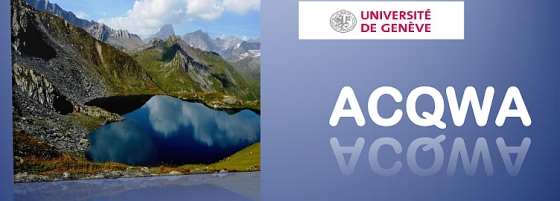FP7 ACQWA

The ACQWA Project (Assessing Climate impacts on the Quantity and quality of WAter) is a large-scale integrating project, with 35 partners and a budget of EURO 6.5 million.
As the evidence for human induced climate change becomes clearer, so too does the realization that its effects will have impacts on socio-economic systems and terrestrial ecosystems. Some regions are more vulnerable than others, both to expected physical changes and to the consequences they will have for ways of life. Mountains are recognized as particularly sensitive physical environments with populations whose histories and current social positions often strain their capacity to accommodate intense and rapid changes to their resource base. This proposal aims to assess the impacts of a changing climate, focusing on the quantity and quality of water originating in mountain regions, particularly where snow- and ice melt represent a large, sometimes the largest, streamflow component. There, they represent a local resource (freshwater supply, hydropower generation, irrigation), but in most cases also considerably influence the runoff regime of the downstream rivers and the related water availability. Such an influence is reflected mainly in the amount of surface water available for supplying irrigated agriculture and water supply systems, but also in the amount of groundwater recharge that can take place in river–fed aquifers. An increasing number of evidences of glacier retreats, permafrost reduction and snowfall decrease have been observed in many mountainous regions, thus suggesting that climate modifications may seriously affect streamflow regimes, in turn threatening the availability of water resources, increasing the downstream landslide and flood risk, impacting hydropower generation, agriculture, forestry, tourism and, last but not least the water dependent ecosystems. As a consequence, socio-economic structures of downstream living population will be also impacted, calling for better preparedness in developed countries and strategies to avoid the exacerbation of the already conflictual situation in many developing countries, like those in Central Asia and South America.
The goal of the project is to use advanced modelling techniques to quantify the influence of climatic change on the major determinants of river discharge at various time and space scales, and analyse their impact on society and economy, also accounting for feedback mechanisms. The focus will be on continuous transient scenarios from the 1960s up to 2050. In comparison to many existing studies, the limitation of the modelling horizon to mid of the 21st century allows to develop more realistic assessment of the progressive impact on the social, economical and political systems, which we expect to evolve typically in an adaptive mode on shorter time scales than the centennial ones, eventually shifting to new equilibria when forced abruptly.
